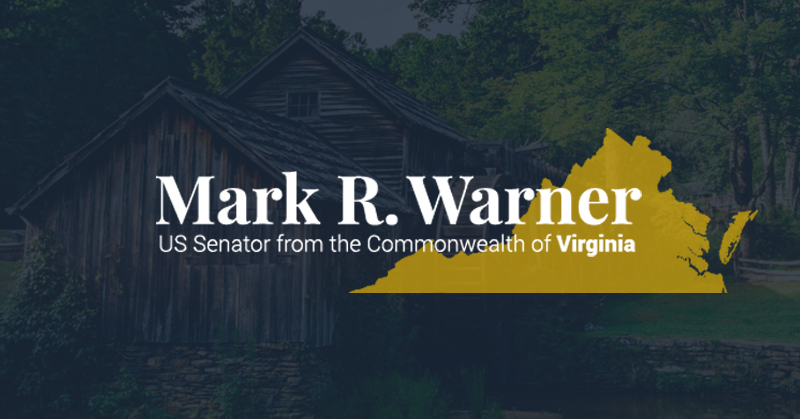Source: United States Senator for Commonwealth of Virginia Mark R Warner
WASHINGTON – U.S. Sen. Mark R. Warner (D-VA) yesterday requested more information from major retailers regarding omicron-related supply chain problems and shortages that are contributing to inflation and rising costs. In a letter to the National Retail Federation – the world’s largest retail trade association, representing large retail companies like Target and Wal-Mart – Sen. Warner expressed concern with the ongoing supply chain disruptions and stressed that companies and the government must work together to tackle the problems that are leading to higher prices and directly hitting Americans’ pockets.
“Despite the unprecedented challenges associated with reopening the nation and fighting the Delta and Omicron variants, our economy has recovered significantly since the onset of the COVID-19 pandemic. However, increasing prices continue to threaten our progress. I understand that persistent supply/demand imbalances and supply chain disruptions are contributing to inflation and urge you to continue working with me, my colleagues, and the Biden Administration to identify ways to alleviate these supply chain issues as quickly as possible,” Sen. Warner wrote.
He continued, “I am also continuing to advance legislation that addresses targeted supply chain issues that have shown to have sweeping impacts on our economy, including the U.S. Innovation and Competition Act which includes $52 billion for domestic semiconductor manufacturing. However, it is clear that these efforts will likely take time to bear fruit, and that more needs to be done now to help Americans facing raising prices.”
In the letter, Sen. Warner asked companies what they are doing to resolve the supply chain problems and what more the federal government can do to support those efforts. Specifically he posed the following series of questions to better understand the steps being taken by companies to alleviate supply chain pressures and to inquire about any additional measures that Congress can take to assist with this effort:
- Alleviating existing backlogs continues to be an immediate priority for the private sector as well as the government. Can you please explain what your companies are doing to alleviate backlogs and what challenges you are facing? Are there any constraints that lend themselves to policies that Congress should pursue?
- How long do you see supply chain pressures lasting? Do you believe the supply chain problems we are seeing will begin to soften in 2022?
- What more can Congress, or the federal government, do to support your efforts to clear these backlogs and strengthen our nation’s supply chains?
A copy of the letter is available here and below.
Dear National Retail Federation Board Leadership and Board of Directors:
I write today concerned with the challenges posed by elevated levels of inflation in our economy. Despite the unprecedented challenges associated with reopening the nation and fighting the Delta and Omicron variants, our economy has recovered significantly sine the onset of the COVID-19 pandemic. However, increasing prices continue to threaten our progress. I understand that persistent supply/demand imbalances and supply chain disruptions are contributing to inflation and urge you to continue working with me, my colleagues, and the Biden Administration to identify ways to alleviate these supply chain issues as quickly as possible.
The latest release from the Bureau of Labor Statistics found that prices increased seven percent from a year earlier, the fastest pace in decades.[1] As you know, these price increases are particularly harmful for low-income Americans who have smaller economic cushions to absorb them. Many factors are contributing to the current bout of inflation, but widespread supply chain issues are of particular concern. That’s why I am grateful to President Biden for engaging with the private sector, making supply chains a key priority, forming the Supply Chain Disruptions Task Force and directing a whole-of-government approach to address the vulnerabilities and problems facing the country’s supply chains.[2]
Congress has also taken decisive action to reduce friction in the economy by passing the Infrastructure Investment and Jobs Act to make historic investments in infrastructure. I am also continuing to advance legislation that addresses targeted supply chain issues that have shown to have sweeping impacts on our economy, including the U.S. Innovation and Competition Act which includes $52 billion for domestic semiconductor manufacturing. However, it is clear that these efforts will likely take time to bear fruit, and that more needs to be done now to help Americans facing raising prices.
To that end, I am writing to request answers to the following questions from the organizations you represent:
- 1. Alleviating existing backlogs continues to be an immediate priority for the private sector as well as the government. Can you please explain what your companies are doing to alleviate backlogs and what challenges you are facing? Are there any constraints that lend themselves to policies that Congress should pursue?
- 2. How long do you see supply chain pressures lasting? Do you believe the supply chain problems we are seeing will begin to soften in 2022?
- 3. What more can Congress, or the federal government, do to support your efforts to clear these backlogs and strengthen our nation’s supply chains?
During these past two years, our nation has faced tremendous costs and dislocations from the pandemic, which required bipartisan and public-private cooperation. While the country has made substantial economic progress since the spring of 2020, this cooperation and focus will continue to be vital, particularly as we face rising prices and additional waves of the virus.
Thank you for your attention to this important matter.
###
